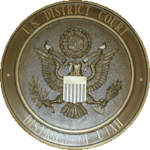| SCO–Linux disputes |
|---|
| Overview |
| Litigation |
| Companies involved |
| Individuals involved |
| Other |
| SCO Group, Inc. v. Novell, Inc. | |
|---|---|
 | |
| Court | United States District Court for the District of Utah |
| Full case name | The SCO Group, Inc. v. Novell, Inc. |
| Decided | June 10, 2010 |
| Docket nos. | 2:04-cv-00139 |
| Citation | 721 F. Supp. 2d 1050 |
| Case history | |
| Prior actions | 578 F.3d 1201 (10th Cir. 2009); cert. denied, 561 U.S. 1051 (2010). |
| Subsequent action | 439 F. App'x 688 (10th Cir. 2011). |
| Related action | United States Bankruptcy Court for the District of Delaware |
| Holding | |
| SCO's claims of ownership of Unix intellectual property dismissed; Novell's claims of ownership confirmed; SCO owed Novell $2.5 million in unpaid royalties | |
| Court membership | |
| Judges sitting | Dale A. Kimball Ted Stewart |
| Keywords | |
| copyright, slander of title, breach of contract, breach of fiduciary duties, conversion, unjust enrichment | |
SCO v. Novell was a United States lawsuit in which the software company The SCO Group (SCO), claimed ownership of the source code for the Unix operating system. SCO sought to have the court declare that SCO owned the rights to the Unix code, including the copyrights, and that Novell had committed slander of title by asserting a rival claim to ownership of the Unix copyrights. Separately, SCO was attempting to collect license fees from Linux end-users for Unix code (that they alleged was copied into Linux) through their SCOsource division, and Novell's rival ownership claim was a direct challenge to this initiative. Novell had been increasing their investments in and support of Linux at this time, and was opposed to SCO's attempts to collect license fees from Novell's potential customers.
The case hinged upon the interpretation of asset-transfer agreements governing Novell's sale of their Unix business to one of SCO's predecessor companies, the Santa Cruz Operation. The original APA explicitly excluded all copyrights from the assets transferred from Novell to the Santa Cruz Operation. The second amendment to the APA amended the agreement to exclude all copyrights, "except for the copyrights required for the Santa Cruz Operation to exercise its rights" under the APA. The list of included assets was never amended, which caused ambiguity years after the deal was signed. At trial, Novell successfully argued that they had retained copyrights to protect their 95% ownership of Unix SVRX royalties, and that the amendment to the exclusion clause was merely affirming that the Santa Cruz Operation had a license to the Unix code.
Novell counter-sued with their own duelling slander of title claim and several additional claims against SCO related to the APA and asked the Court to find that SCO had breached the agreements by signing Unix license agreements with Sun Microsystems and Microsoft without paying Novell the agreed percentage of those agreements. Novell further asked the court to find that Novell retained the right to direct SCO to waive rights under existing Unix licenses at "Novell's sole discretion", and that they had the right to take the action on SCO's behalf if SCO refused (a purported right that Novell had used repeatedly in the months leading up to the lawsuit to waive SCO's claims against IBM and others). Additional claims and counterclaims were added by the parties before resolution of the case.
Novell was found to be the owner of the Unix copyrights, to have the right to direct SCO to waive its claims against IBM and other Unix licensees (and to do so on behalf of SCO if they refused), and SCO was found to have breached the asset-transfer agreements and to have committed conversion of Novell's property. SCO prevailed on none of their claims against Novell.
